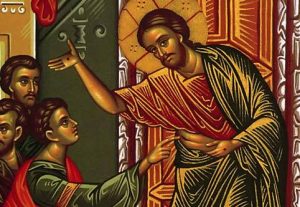Saint Thomas Sunday: Antipascha
 Every day during the week of Easter, called Bright Week by the Church, the paschal services are celebrated in all their splendor. The Easter baptismal procession is repeated daily. The royal gates of the sanctuary remain open. The joy of the Resurrection and the gift of the Kingdom of eternal life continue to abound. Then, at the end of the week, on Saturday evening, the second Sunday after Easter is celebrated in remembrance of the appearance of Christ to the Apostle Thomas “after eight days” (John 20.26).
Every day during the week of Easter, called Bright Week by the Church, the paschal services are celebrated in all their splendor. The Easter baptismal procession is repeated daily. The royal gates of the sanctuary remain open. The joy of the Resurrection and the gift of the Kingdom of eternal life continue to abound. Then, at the end of the week, on Saturday evening, the second Sunday after Easter is celebrated in remembrance of the appearance of Christ to the Apostle Thomas “after eight days” (John 20.26).
It is important to note that the number eight has symbolical significance in both Jewish and Christian spiritual tradition. It signifies more than completion and fullness; it signifies the Kingdom of God and the life of the world to come since seven is the number of earthly time. The sabbath, the seventh day, is the blessed day of rest in this world, the final day of the week. The “first day of the week,” the day “after Sabbath”; stressed in all of the gospels as the day of Christ’s Resurrection (Mk 16.1, Mt 28.1, Lk 24.1, Jn 20.1,19), is therefore also “the eighth day,” the day beyond the confines of this world, the day which stands for the life of the world to come, the day of the eternal rest of the Kingdom of God (see Hebrews 4).
The Sunday after Easter, called the Second Sunday, is thus the eighth day of the paschal celebration, the last day of Bright Week. It is therefore called the Antipascha, and it was only on this day in the early church that the newly-baptized Christians removed their robes and entered once again into the life of this world.
In the Church services the stress is on the Apostle Thomas’ vision of Christ and the significance of the day comes to us in the words of the gospel:
Then He said to Thomas, “Put your finger here, and see My hands; and put out your hand, and place it in My side; do not be faithless, but believing.” Thomas answered Him, “My Lord and my God!” Jesus said to him, “Have you believed because you have seen Me? Blessed are those who have not seen and yet believe” (John 20.27–29).